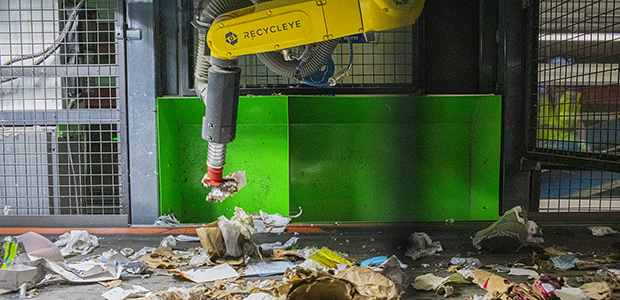
Recycleye: A 20/20 view of a greener future
With an entrepreneurial green heart, Victor Dewulf, CEO and Co-Founder of Recycleye, took the ultimate leap of faith from his Environmental Engineering PhD course to establish Recycleye with fellow Co-Founder and classmate Peter Hedley.
A university project turned business
“I had always had an entrepreneurial streak, running a lucrative lighter business whilst studying at university!” says Dewulf. It was at university that he would meet his Co-Founder and Recycleye’s current CTO, Peter Hedley, whilst studying Civil Engineering at the University of Bath. The two would then go on to pursue a Master’s degree in Environmental Engineering and Computer Science at Imperial College London, where the vision for Recycleye would come into focus.
“My Master’s thesis focused on building a prototype of what we now call ‘Recycle Vision,’ and, after a year-long stint at Goldman Sachs, I returned to Imperial to explore the project further through a PhD,” explains Dewulf.
Dewulf was inspired by all of the fascinating work that was happening from his friends in Computer Science and figured why not combine this aspect with the waste and water projects he worked on. So that’s exactly what he did: “The computer vision projects that my friends in Computer Science were doing, like self-driving cars, were much more interesting than the waste and water projects that my course peers were proposing. So, I decided to combine the two and harness the power of AI and computer vision for waste detection.”
Bringing a new set of eyes to waste sorting
Recycleye utilises the power of AI to deliver sorting technologies, such as robotics or optical sorters, to the global waste management industry. Recycleye’s goal is to drive visibility and profitability within material recovery facilities across Europe and the US.
This is achieved through the automation of traditionally manual waste sorting tasks in facilities whilst simultaneously unlocking new capabilities, such as food contact and non-food contact packaging.
“By lowering costs of sorting and bolstering revenue gained from material resale, we are reinventing the economics of recycling, making it more economically viable to turn the world’s waste into resource,” says Dewulf.
“We now have 35 engineers and commercial experts in the team, which has been facilitated in part by VC funding rounds. Our team has also worked hard to establish reference sites for our robot in all of our European target geographies, whilst simultaneously becoming the leading manufacturer in the UK and Ireland. Once this was underway and our technical customer support team had established happy customers, we released our second product, the optical sorter, which transported us beyond the household recyclables market into electronic, metals and construction and demolition waste sectors,” enthused Dewulf about his companies’ journey to today.
Sorting through the bad bits
Not all has been a smooth picking order for Recycleye, and working within a well-established industry has come with its own set of challenges to overcome. Most notably, Recycleye has had to try to repair the damage done by over-promising predecessors to the industry. As Dewulf explains: “Repairing market perception of robots after the damage done by equipment manufacturers that came before us has been one of our biggest challenges so far.
“The waste industry is relatively traditional and relies on analogue machinery and manual picking for most of its separation process. A few years before Recycleye was founded, other manufacturers installed robots in applications where they didn’t work well, and we are still having to work very accurately (and hard!) to unwrite this story of instability and low performance, even with 40 successful units of our own installed across the field.”
Trying to disrupt a firmly set, and previously upset, industry is no small feat but one that Recycleye has been taking in strides.
Seeing the success
Despite the challenges faced on Recycleye’s journey so far, the company has also seen a plethora of success and highlights along the way.
Above all, Dewulf is proud of his team and the strives they have made to bring success and innovation each step of the way. “I’m so proud of everything our team achieves,” gleams Dewulf. “We have developed the bestselling waste-sorting robot in the UK and Ireland, and released the first AI-only optical sort for waste-sorting in the world. Every day, the team are breaking new ground and releasing solutions to problems that have been obstructing the waste industry for many years.
“And that’s worth more than the Forbes 30 Under 30 for sure!” he jests.
Beyond this, just getting to see the companies’ product in action is one of the best feelings, as it is for any fletching company. “Watching our robots extract valuable recyclables otherwise headed for landfill at sites run by the market leaders, such as Veolia and FCC Environment in the UK and Urbaser in Spain, is always a milestone moment too,” he says with a smile. It’s all in seeing the impact for the team at Recycleye and with each new facility taking up its robots, another domino topples.
Picking out the next direction
Recycleye isn’t planning on sitting still anytime soon and has a lot of ideas for the future. Whilst not everything can be revealed right now, Dewulf could say that the next big step is expanding into new materials markets. “Valuable materials aren’t just being downcycled in the municipal solid waste sector, but also in organic, textile, electronic, and construction waste.
“We’ve started out in WEEE and C&D, which are sectors that are hungry for visibility in an often-invisible removal chain, and it’s exciting to see how much untapped potential there is in separating precious materials from residue.
“After that, to infinity and beyond!”
This article originally appeared in the November/December 2024 issue of Startups Magazine. Click here to subscribe

